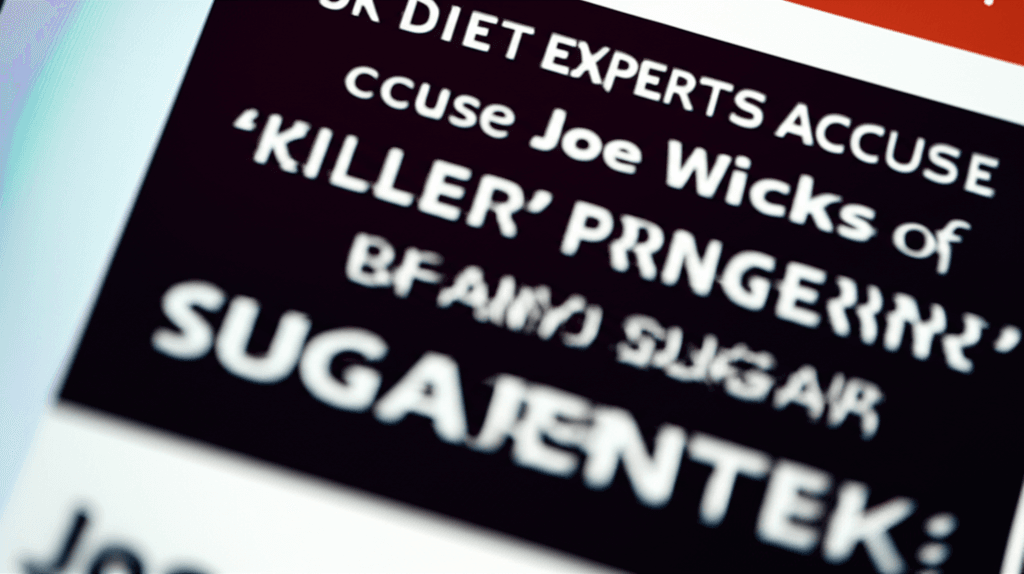Leading UK diet and nutrition experts have accused fitness influencer Joe Wicks, widely known as The Body Coach, of “scaremongering” following a controversial marketing stunt for a new documentary and earlier comments regarding sugar consumption. Critics argue Wicks’s methods, particularly the launch of a “Killer” protein bar, employ fear-based health claims and misinformation that could be detrimental to public understanding of nutrition and potentially encourage disordered eating.

The “Killer” Protein Bar Stunt Sparks Outcry
The most recent wave of criticism stems from Wicks’s satirical launch of a “Killer” protein bar, designed to promote his upcoming Channel 4 documentary, “Joe Wicks: Licensed to Kill.” The documentary aims to expose the alleged dangers of ultra-processed foods (UPFs) and advocate for stricter government regulations on food labelling.
Wicks and Professor Chris van Tulleken, who co-created the bar, stated it was deliberately made “as unhealthy as we could, using all perfectly legal ingredients” to highlight how easily products containing potentially harmful additives can be marketed as health foods. The bar’s packaging provocatively claims ingredients can cause “strokes, cancer, diarrhoea and even death.”
However, this highly provocative approach has drawn significant backlash from across the nutrition industry. Dietitian Dr. Carrie Ruxton, for example, noted that there is “no consensus about the validity or applicability of the NOVA classification in the academic community” regarding UPFs and questioned the accuracy of claims that UPFs universally harm health. Other nutritionists have deemed the stunt “misguided” and accused Wicks of using “fear-mongering tactics that could drive consumers away from making healthier decisions.”
Nichola Ludlam-Raine, a dietitian and author, acknowledged Wicks’s good intentions but suggested he chose the wrong example, stating that protein bars are functional foods and “can be a healthier choice compared to a standard chocolate bar” if not perceived as a substitute for truly nutrient-rich foods. Legal experts have also flagged potential risks related to defamation and misleading health claims due to the dramatic assertions made about the “Killer” bar.

Previous Controversy: “Sugar Relapse” and Fruit Demonisation
This is not the first time Joe Wicks has faced scrutiny from health professionals. Earlier this year, Wicks garnered criticism for his “sugar relapse” confession on Instagram. After adhering to a no-sugar diet for 11 weeks, he shared that he had “relapsed” by eating a packet of Jaffa Cakes, followed by brownies and “loads of fruit,” which he described as “not normal.”
Nutritionists and other health and fitness professionals voiced concerns that Wicks’s language, likening sugar consumption to an “addictive substance” and using the term “relapse,” could promote a negative relationship with food and potentially trigger disordered eating behaviours in his large following. GP Dr. Michael Mrozinski questioned Wicks’s demonisation of entire food groups, while nutritionist Joshua Hills expressed concern that Wicks was “encouraging millions to do the same with cutting out sugar” despite his own “poor relationship with sugar.”
The criticism also extended to Wicks’s comments on fruit, which some interpreted as demonising a healthy food source by including it in his “binge” list.

Wicks’s Intentions and Defence
Joe Wicks has publicly stated his intentions are to raise awareness about the food system and empower individuals to make informed choices. Regarding the “Killer” bar stunt, he emphasized that the goal is to “expose the truth of ultra-processed food” and pressure the government for change. Wicks has acknowledged the criticism, stating during his documentary that some accuse him of “demonizing foods” but argues his concern lies with the addictive nature of UPFs, which makes moderation difficult for many.
Despite the backlash, Wicks maintains his belief that there is a “strong and growing body of science and evidence now to show that these foods are damaging our health.” The revenue generated from sales of the “Killer” bar is reportedly going to charities promoting healthy eating.







